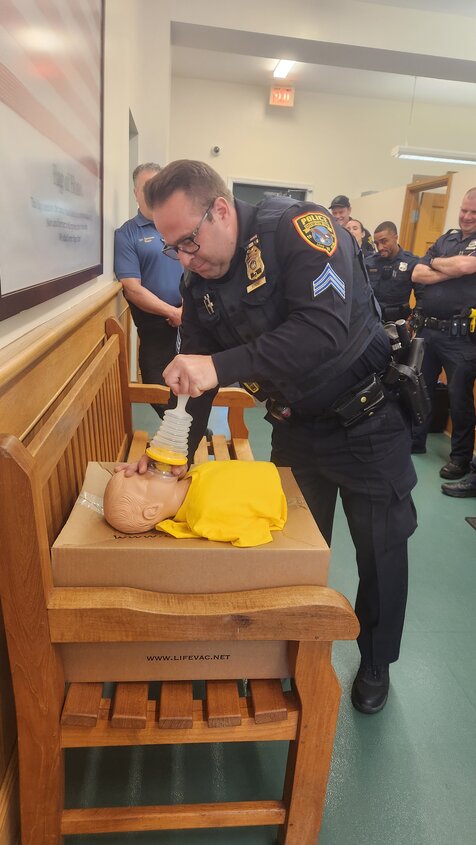LifeVac is now a P.D. tool for emergencies
Steven Grella, a detective in the Glen Cove Police Department, still clearly recalls his harrowing experience when his 7-day-old son had a choking emergency. Born prematurely, the infant struggled as mucus obstructed his airway, prompting Grella to rely on his training in cardiopulmonary resuscitation. Despite his efforts, 12 agonizing minutes ticked by as his newborn, going in and out of consciousness, turned blue.
“It was a difficult moment for me, especially being someone who is CPR trained,” Grella said. “I thought that my skills would be enough to help my son, and for a few minutes, they weren’t.”
Grella’s ordeal is just one example of the challenges first responders — or parents — face in life-threatening emergencies. Choking is the fourth-leading cause of death in children in the United States, causing 5,000 deaths per year, and children under 5 are at greatest risk for choking injury and death. But the LifeVac rescue device has saved more than 2,100 lives in choking emergencies since 2014.
LifeVac is intended to be used after other lifesaving protocols, like abdominal thrusts and CPR, have failed.
The Glen Cove P.D. has 18 LifeVacs. The device resembles a small toilet plunger, with bellows that attach to a clear facemask that’s placed over the nose and mouth of someone who is choking. The rescuer pushes the bellows’ handles down and then up, forcing air out of the sides of the device, which creates a vacuum that sucks the object out of the airway when the lever is pulled back again.
The procedure, according to LifeVac, replicates a forced cough to expel an object out of a choking person’s throat. The company’s website states that the device has saved children ranging from 3 weeks to 13 years old.
“When it comes to saving someone’s life, you want to have as many tools as possible,” Grella said. “LifeVac is one of those things that I would have really loved to have had.”
The device comes with adult and pediatric masks, and is best suited to those weighing more than 20 pounds, although it can be used in emergencies involving infants as well. Users who fill out a form attesting that they saved a life using a LifeVac are sent another kit free of charge if the incident is verified.
The inspiration for the device grew out of a heartbreaking tale recounted to Arthur Lih, the company’s founder and CEO, of a young boy’s tragic death caused by a grape lodged in his windpipe. Lih and a group of friends decided to create a device that would clear airway obstructions, and set up a research and development facility in Springfield Gardens, Queens.
Sgt. Salvatore Bifone, of the GCPD, found the lifesaving equipment through an online advertisement.
“I was glad to be able to put my hands on it and try it,” Bifone said after a department training session on May 6. “I realized how easy it is to use, and how quick and effective it is to use.”
The Food and Drug Administration issued a safety communication about anti-choking devices on April 22, urging consumers to remember that “The safety and effectiveness of over-the-counter anti-choking devices have not been established; they are not FDA approved or cleared.”
Laura Bonelli, a spokesperson for LifeVac, said that the company works directly with the FDA to ensure the quality of its products.
“We were surprised when we saw the report, because we don’t know of any safety or effectiveness issues that apply to our device,” Bonelli said. “We can confirm that we’re working with the agency, but in accordance to the code of federal regulations, there’s a confidentiality issue, so we can’t really disclose exactly what we’re working with them on.”
Heidi Beth Felix, LifeVac’s vice president of sales, who demonstrated how the device works, said she was confident in the device’s ability to save lives, and noted the video testimonials from police officers and parents on the company’s website.
“I have a mother with dementia, and it’s one of those things that she keeps right next to her when she’s eating, because she loves her steak and shrimp,” Felix said. “Young or old — we’ve saved anyone from a newborn to a 100-year-old person in their wheelchair.”

 58.0°,
Partly Cloudy
58.0°,
Partly Cloudy 





